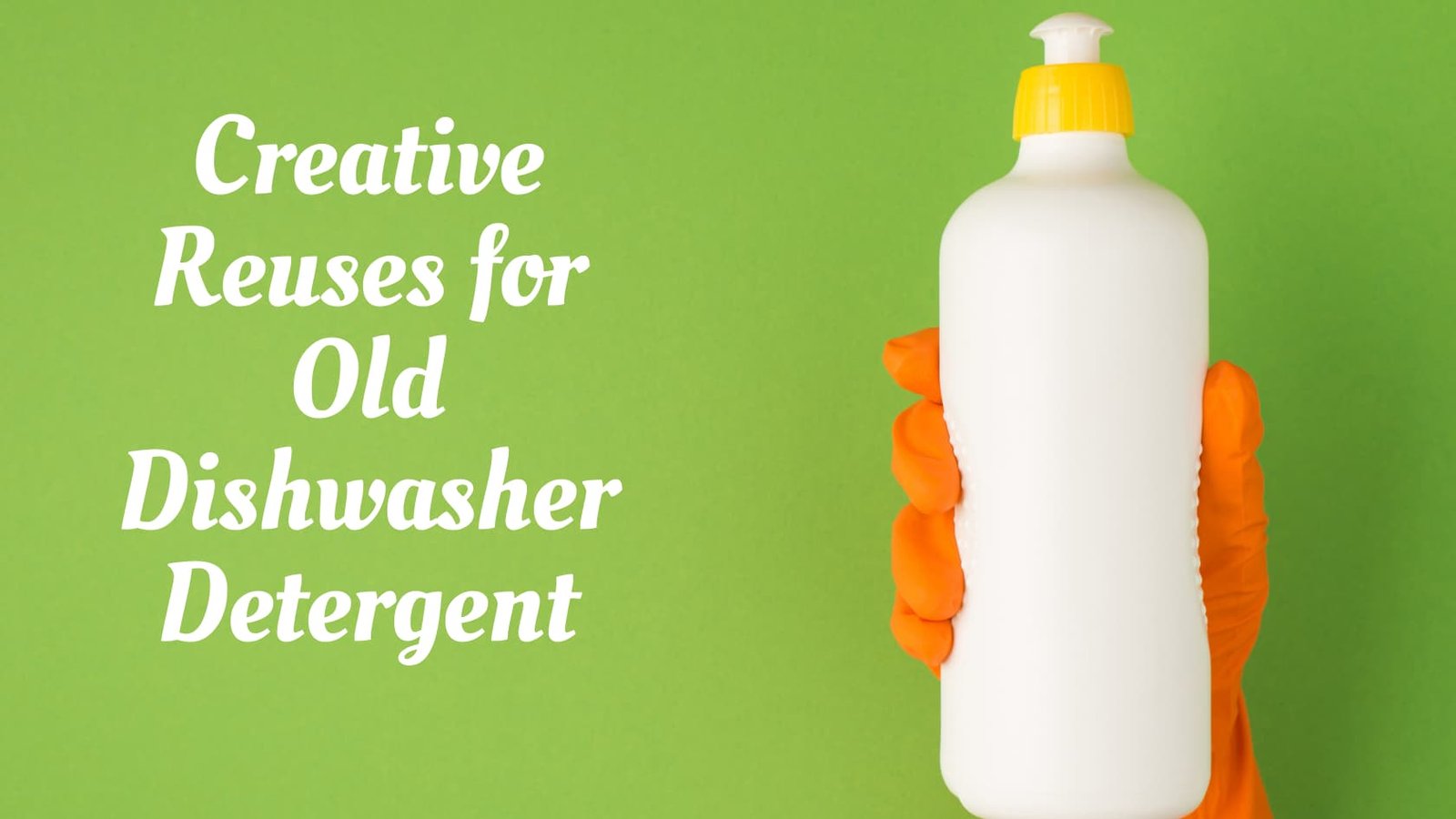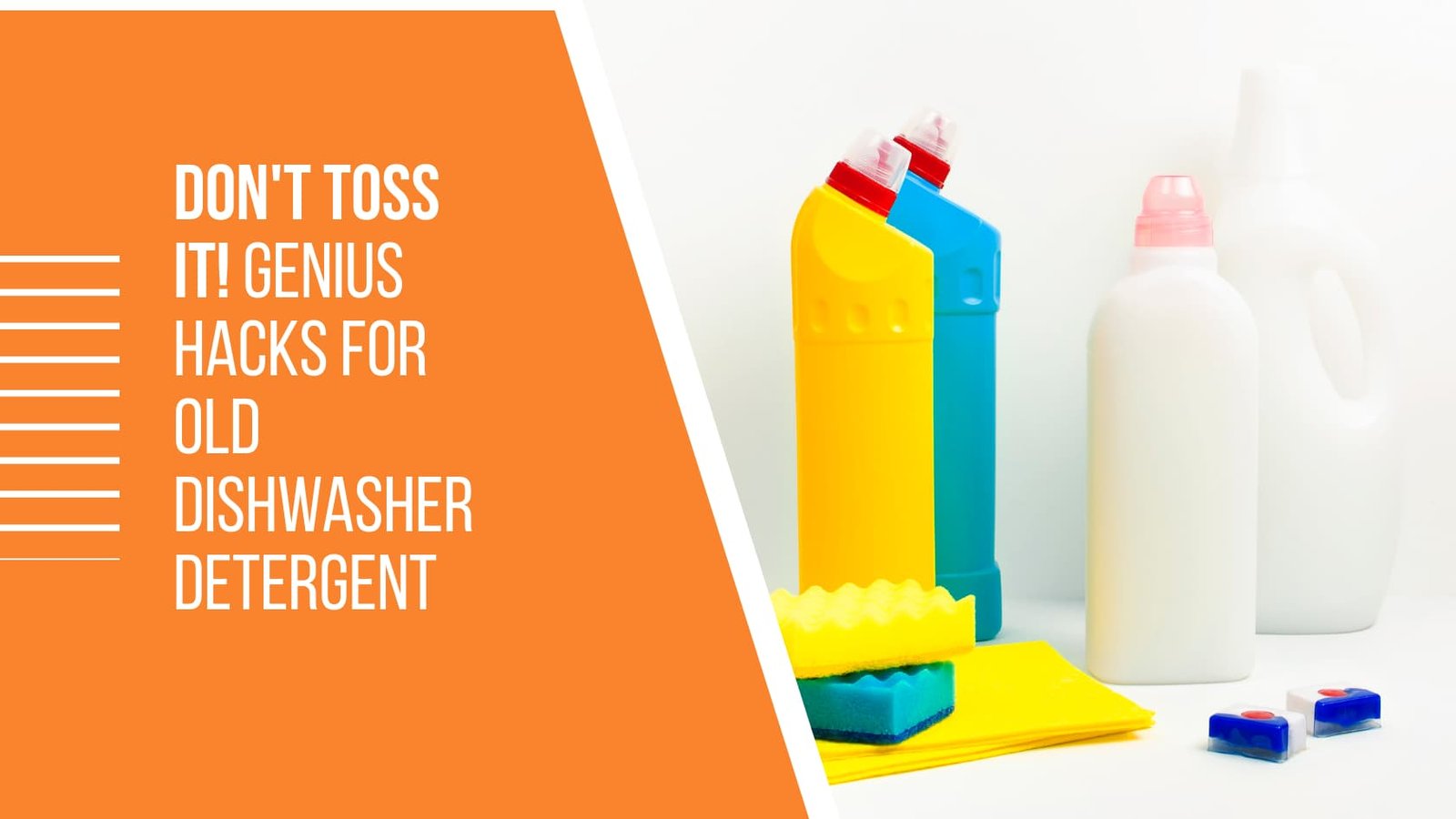Staring at that half-empty box of dishwasher detergent in your cleaning cupboard? You might have wondered what to do with old dishwasher detergent?
It’s a common household dilemma. This unassuming box, often overlooked, holds more potential than meets the eye.
In this article, I’m diving into the world of decluttering and cleaning.
With smart, innovative tips, I’ll guide you through re-purposing that old dishwasher detergent. Turning what could be wasted into a treasure trove of cleaning hacks.
Let’s delve into how to handle and make the most out of your old dishwasher detergent.
Some links in this post are affiliate links, meaning, at no additional cost to you, we may earn a commission if you click through and make a purchase. As an Amazon Associate, I earn from qualifying purchases.
Is Your Dishwasher Detergent Past Its Prime?
When you load your dishwasher, you expect sparkling results.
But has your detergent lost its edge?
If you notice your dishes aren’t as clean as they used to be, it could be a sign that your dishwasher detergent has diminished in effectiveness.
The shelf life of dishwasher pods varies by brand, but generally, they last for about 12-15 months
Detergents can last for about 12 to 15 months and they do degrade over time, particularly when exposed to moisture or extreme heat.
Here’s what to watch for
Clumps: Good detergent is free-flowing, not lumpy.
Appearance: A fresh detergent looks vibrant, not dull.
Scent: An effective detergent retains its original scent.
These signs indicate it’s time to test your detergent.
To do this, run a small load with your suspect detergent. If your dishes emerge less than sparkling, it’s likely that the detergent is to blame.
To avoid this, store your detergent in a place that’s consistently cool and dry to prolong its effectiveness.
And remember, hot water is your dishwasher’s best friend. It enhances detergent performance and ensures a more hygienic clean.
If your old detergent just isn’t cutting it anymore, it might be time to refresh your supply for the cleanest, shiniest dishes.
Safe Disposal: What You Need to Know

Disposing of dishwasher detergent responsibly is crucial for safeguarding the environment and conforming to local regulations.
As with any chemical product, careless disposal of dishwasher detergent can lead to ecological disturbances. This could affect aquatic species and pollute waterways.
It’s important to be aware of proper disposal methods that adhere to eco-friendly practices.
This includes respecting the guidelines provided by authorities and product manufacturers.
How to properly dispose of your old dishwasher detergent
Disposing of detergent is crucial to prevent environmental harm. Here are some tips on how to do it
Read the Label: Begin by checking the dishwasher detergent’s label for any disposal instructions provided by the manufacturer.
Use Completely: Aim to use all the detergent to minimize waste. Only dispose of the container once it’s empty.
Dilute Liquid/Gel Detergents: If disposing of liquid or gel detergents, dilute them with water first. Do not pour them directly down the drain.
Dissolve Powders/Tablets: For powder detergents or tablets, dissolve them in water before disposal to reduce impact.
Recycle the Container: Clean and dry the empty detergent container, then recycle if possible, according to local recycling guidelines.
Avoid Mixing Chemicals: Never mix dishwasher detergent with other chemicals during disposal to prevent dangerous reactions.
Consult Waste Management: If unsure about disposal methods, contact your local waste management authority for guidance, especially for hazardous waste disposal.
Can You Pour It Down the Drain?
When it comes to liquid dishwasher detergents, many homeowners wonder if it’s safe to pour them down the kitchen drain.
Generally, the answer is yes.
Most household liquid detergents are designed to be water-soluble and can be diluted and washed away with running water.
Wastewater treatment systems are equipped to process these substances, mitigating the risk of environmental damage.
However, when dealing with powdered dishwasher detergents, especially those that contain potentially disruptive ingredients like phosphates or bleach, you need to take extra care.
These chemicals can indeed harm local ecosystems if they reach bodies of water in high concentrations.
Therefore, I’ll advise to avoid pouring large amounts of these detergents down the drain.
Instead, use them up gradually in the dishwasher as intended, and consider switching to more eco-friendly options that are free of such harsh chemicals in the future.
Hazardous Waste Facilities: When to Consider
For situations where you have large quantities of detergent to dispose of, or if you’re dealing with industrial-grade cleaners, it’s best to turn to a hazardous waste facility.
These specialized centers can handle the safe disposal of chemical products. Reducing the potential environmental impact.
Before you take your detergent to a hazardous waste facility, you should
Consult the detergent packaging for any disposal instructions provided by the manufacturer.
Check with your local waste management authorities to understand the specific disposal guidelines in your area.
Creative Reuses for Old Dishwasher Detergent

Rather than disposing of your old dishwasher detergent, you can give it a second life by repurposing it for a variety of cleaning tasks around your home.
This approach not only minimizes waste but also harnesses the detergent’s powerful cleaning properties beyond the confines of your dishwasher.
Here are some ingenious ways to use up that old dishwasher detergent.
1. Bathroom Brilliance
Transform your dishwasher detergent into a potent paste by mixing it with water.
Apply this mixture to your bathroom surfaces to effectively dissolve soap scum and hard water stains.
Rinse thoroughly after scrubbing to reveal a pristine finish.
2. Driveway Oil Stain Remover
Got unsightly oil stains on your driveway or garage floor?
Sprinkle some powdered dishwasher detergent on the wet stain, give it a few minutes to work its magic.
Then give it a good scrub. Rinse off and watch those stains disappear.
3. Laundry Whitener
Dishwasher tablets can give your whites a new lease on life.
Add a tablet containing bleach to your laundry load instead of extra bleach.
For heavily soiled items, pre-soak them in a mix of hot water, a dishwasher tablet, and a touch of bleach before washing.
4. Wall Cleaner
Mix a dissolved dishwasher tablet in a bucket of hot water for a gentle yet effective wall cleaner.
It’s great for removing scuffs and marks. Be sure to test it on a small area first to ensure it doesn’t discolor your paint.
5. Patio Furniture Polish
This same solution works wonders on plastic patio furniture.
Just wipe down your outdoor pieces with the diluted detergent to remove dirt and grime.
This refreshes your outdoor space with minimal effort.
6. Toilet Bowl Cleaner
Use the leftover paste from your bathroom cleaning or sprinkle some powdered detergent directly into the bowl.
Let it sit, then scrub with a toilet brush. It’s a powerful cleaner that can tackle even the toughest stains.
7. Kitchen Sink Refresh
End your kitchen cleaning with a flourish by giving your sink a bubble bath with dishwasher detergent.
It’ll help loosen and lift any lingering food or grease, leaving your sink sparkling clean with minimal scrubbing.
Conclusion
When dealing with old dishwasher detergent, it is essential to practice responsible use, storage, and disposal.
These steps play a crucial role in household efficiency and environmental care.
If your detergent has surpassed its prime, consider small-scale, safe experiments such as mixing with hot water for cleaning robust, non-food-contact surfaces.
However, always be mindful of the detergent’s ingredients and how they may impact the environment.
Should disposal be necessary, follow local regulations on hazardous waste to limit environmental harm.

Pazi Mboh, our Home Efficiency Advocate, is dedicated to promoting sustainable dishwasher use. His tips on energy and water efficiency not only help the environment but also save on your bills, making his guidance invaluable for eco-conscious households.





